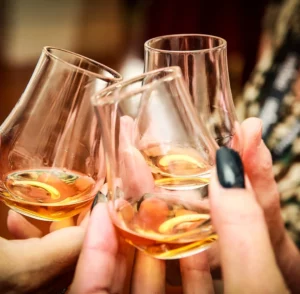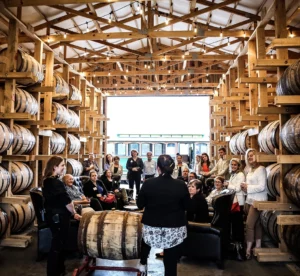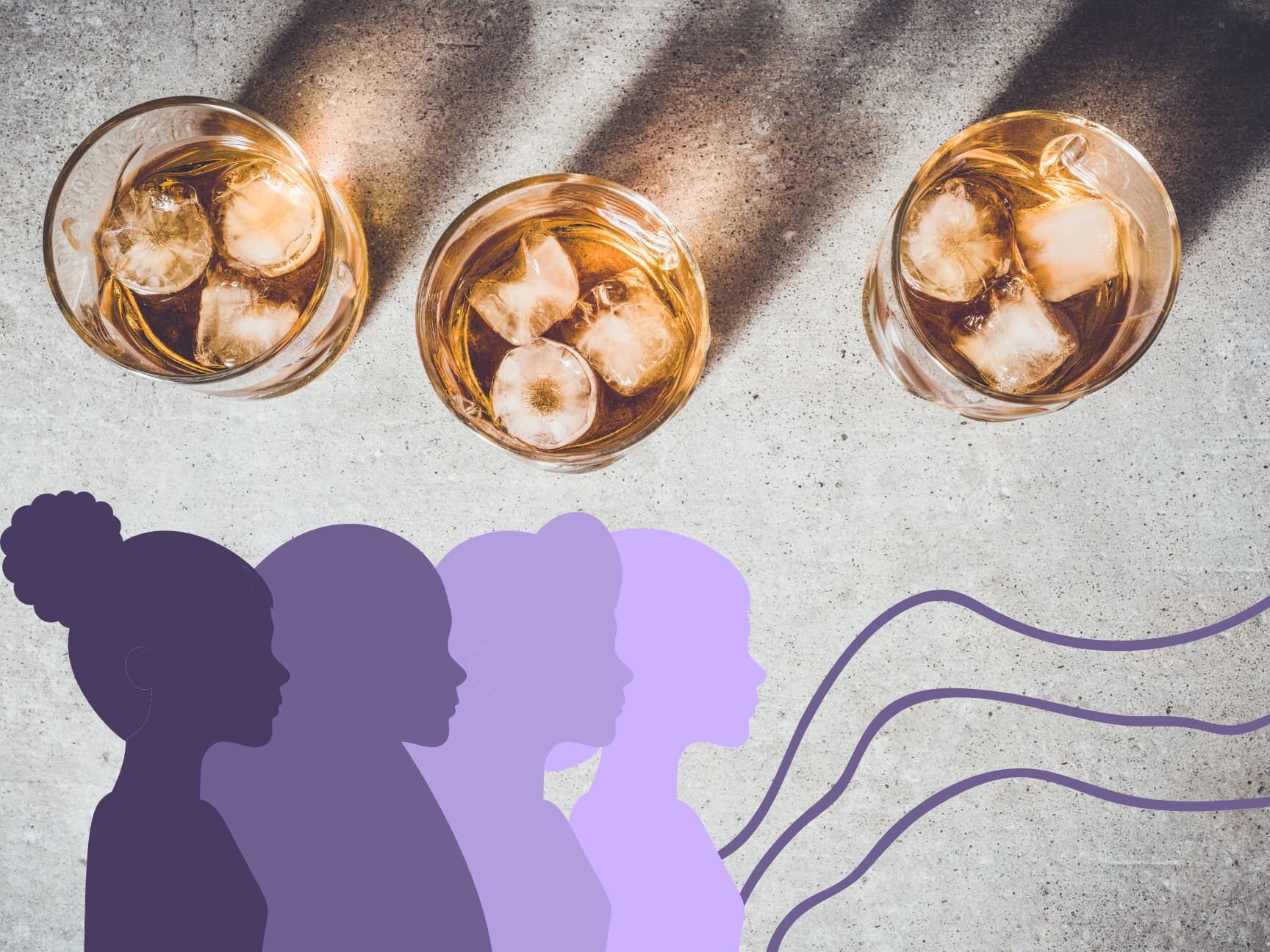Women distillers finding their place in the male-dominated whiskey industry.
Whiskey has long had a reputation as a man’s drink. Old advertisements for Scotch often show a man in Highlander regalia with a glass in his hand. Similarly, vintage bourbon ads will show well-dressed gentlemen enjoying a drink alone or with friends. In these ads, a woman might be shown drinking with a male companion. If a woman is alone in these ads, she is almost exclusively a server or an alluring and mysterious object for the male gaze intended to help sell products. It is only in the last few decades that women have been getting more recognition for their work in the industry.

According to data at Distilling Women, fewer than eight percent of distilleries in the United States are owned and operated by women. It wasn’t until 2015 that Kentucky, considered by many the heartland of bourbon distilling, named its first woman Master Distiller, Marianne Eaves, since Prohibition. Eaves became the Master Distiller at Castle & Key when it was just getting off the ground. The Master Distiller is in charge of creating the concept and flavor of a new product as well as the team manager. It is one of the most vital roles at any distillery. The owners approached her about developing products as well as helping restore the rundown but historic facility. Instead of carrying on the legacy of a Master Distiller who had been working for years, like at most distilleries, she had the opportunity to build something new. Eaves had been working for Brown-Forman at the time, a large spirit and wine company behind brands like Jack Daniel’s, Woodford Reserve, and Old Forester, but saw Castle & Key as a once-in-a-lifetime opportunity. She knew it was a big decision, not just for herself but for the industry. Today, Eaves is credited with helping pave the way for a new generation of women distillers.
American writer and whiskey enthusiast Fred Minnick in his book “Whiskey Women: The Untold Story of How Women Saved Bourbon, Scotch, and Irish Whiskey” writes on how women have always been involved in spirit production, all the way back to brewing beer in Mesopotamia before the invention of the still. Although they may still be underrepresented today, women have a rich history with brewing and distilling, and more are coming into leadership positions all the time.
Lisa Wicker, who became Master Distiller and CEO of Lyons Brewing and Distilling in 2022, is one of the women making whiskey production a more inclusive place. She pointed out in the interview for this piece:
“I do not think ‘who’ is making whiskey has changed outside of more numbers. The history piece is just getting the attention it deserves. There have been women and other minorities distilling for centuries; the history was just ignored. It is great to see the history shared and so many validated for the work they did and do.”
Molly Troupe, the Master Distiller at Freeland Spirits, pointed out that there are more women drinking whiskey as well as distilling. “It happens less and less where my whiskey neat is not confused for the drink of the man next to me. This is progress, albeit slow. Whiskey is diversifying, not just in who makes it, but who is enjoying it.”
The CEO of Kentucky-based distiller Buzzard’s Roost, Judith Hollis Jones, has also seen more and more women drinking whiskey over the past twenty years. She acknowledges it’s still not half and half, but estimates that 30-35% of their customers today are women. This lines up with what data does exist on the matter.
According to NPR, where only 15 percent of whiskey drinkers in the 1990s were women, the stereotype of whiskey being an “old boys club” drink is fading away, and, in 2014, 37 percent of whiskey drinkers were women.
Wicker, Troupe, and Hollis are three women in whiskey making impacts on the diversifying, yet still male-dominant distilling industry. Although they all have the title of either CEO or Master Distiller, the story of how they got there couldn’t be more different.
Entering the whiskey world
Wicker initially went to school to study journalism and went on to work in the arts. She had founded a small professional dance company, had been raising three children, and running a costuming shop when she was invited by two women she knew to work the harvest season at a winery they worked at that was short on farm hands. From that experience, she was offered a job at a winery where she spent eight years learning cellar work and winemaking, both on the job and through taking classes. A job opportunity to make brandy in Kentucky bridged the gap between winemaking and distilling.
After leaving that job, she found herself in bourbon country and worked for several distilleries before opening her own consulting firm. One of her clients, Widow Jane, asked that she stay on as their President, Blender, and Distiller where she helped the company grow over the next five and a half years before it was purchased by Heaven Hill Brands. It was several months after that deal took place that she was offered the role of CEO and Master Distiller at Lyons Brewing and Distilling, her current role.
Troupe majored in chemistry initially to pursue a dream of becoming a forensic anthropologist. Her junior year she still loved chemistry, but her interest in application switched from the crime scene to the still. She completed her master’s in brewing and distilling in Scotland before returning stateside to work in the spirits industry in Oregon.
She’s worked in all areas of whiskey production from beginning to end and now works as Freeland’s Spirits’ Master Distiller where she puts her stamp on the Pacific Northwest’s distilling scene with releases like a pinot noir finished bourbon.
Hollis Jones pivoted to distilling spirits from the food industry. She worked for many years for global chain restaurants specializing in supply chain management and had experience working with manufacturers on developing new products.
She didn’t get into whiskey until she took an early retirement and moved back home to Kentucky. “In about a year, [I] got bored with retirement and said ‘okay, I need to find what I’m gonna do next’,” She said. “I [began] to go to distilleries, talk to people in the business, drink more bourbon, and just understand the industry better, it was the one that really appealed to me. I think it was a natural transference from food.” Eventually, Hollis Jones met up with Jason Brauner, who owned a well-renowned bourbon bar at the time, and the two of them built Buzzard’s Roost.
Experiences in the whiskey industry
While, thankfully, none of these women felt as though the industry as a whole was hostile to women or tried to keep them out, they all acknowledged that being a woman in whiskey is not without its challenges.
Troupe recounts times when she was often one or one of a few women on the team and ran into cases of feeling her thoughts were undervalued or passed along as someone else’s idea. She says there have been times when her direct way of communicating was mislabeled as “abrasive”. For Troupe, working for a woman-led distillery has been a freeing experience. “At Freeland, I can be [short with people at times] and those around me just know that I am not one to mince words.”
Wicker discussed feeling as though there were times she was challenged for being a woman, “Interestingly, the challenges have been from young men, the older guys have been kind and welcoming.”
Hollis Jones articulated that the difficulty some women run into is they do not have access to the network of investors that some men do, as the worlds of business, as well as whiskey, are still fairly male-dominant.
For all of these women, finding welcoming communities and supporting mentors has been key in establishing themselves and making the world of distilling whiskey a more equitable place.

Wicker cited several mentors who took her under their wing throughout her career. One of the most influential of these is Dave Scheurich, a Whiskey Advocate lifetime achievement award winner who has worked for many big brands over the years like Wild Turkey and Woodford Reserve.
Troupe has found that community at her work:
“I have never worked in a more supportive environment than Freeland Spirits. Jill Kuehler, Freeland’s Founder and CEO has put together an amazing team, and she does exactly what a wise leader should do, which is to let her team be amazing. This type of trust just radiates throughout the distillery and sets the tone daily. It also helps to be surrounded by such great coworkers because, as with any small business, you don’t always know what the day will bring, other than a longer to-do list.”
There are also more and more organizations with a focus on promoting women in whiskey. Bourbon Women is an organization dedicated to supporting women of diverse backgrounds through networking and education opportunities, including their yearly “SIPosium”. Hollis Jones is a member and has met women with experience throughout the industry in this community.
In 2019, Karen Locke, the founder of a niche-marketing agency for craft beverages, launched Women in Distilling. This site supports women and minorities in distilling via blog features and a map showing the locations of women-owned and led distilleries around the world.
Seeing how much has changed in the last 20 years, it is clear that this is an exciting time as more women are being promoted to leadership roles within the industry. As the whiskey industry diversifies, both in who runs it and who enjoys the final product, it will be interesting to see whiskey take on a new identity when it is no longer seen simply as a “man’s drink”.

